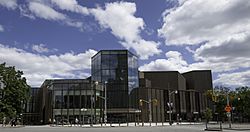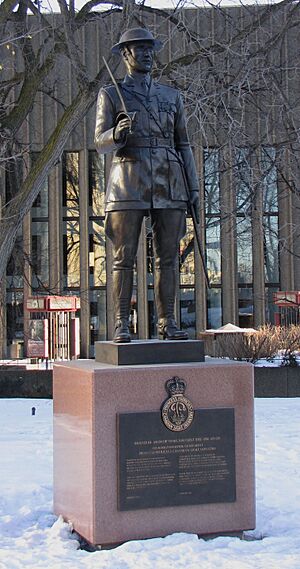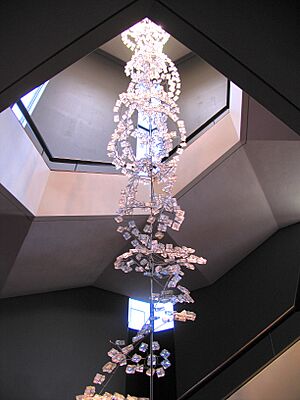National Arts Centre (building) facts for kids
| Centre national des Arts | |
 |
|
| Address | 1 Elgin Street |
|---|---|
| Location | Ottawa, Ontario, Canada |
| Coordinates | 45°25′23″N 075°41′38″W / 45.42306°N 75.69389°W |
| Public transit | |
| Owner | Government of Canada |
| Type | Arts centre |
| Capacity | 3,679 (1969-2017) 3,421 (2017-present) |
| Construction | |
| Broke ground | 1965 |
| Opened | May 31, 1969 |
| Construction cost | $46 million |
| Architect | Fred Lebensold |
| Official name: National Arts Centre National Historic Site of Canada | |
| Designated | 2006 |
| Reference no. | 9091 |
The National Arts Centre (NAC), also known as the Centre national des Arts in French, is a special place in Ottawa, Ontario, Canada. It is a big building where people can enjoy many different kinds of shows, like music, dance, and plays. You can find it right next to the Rideau Canal. The NAC is run by a group called the National Arts Centre organization. In 2006, it was even named a National Historic Site of Canada, which means it's a very important building in Canadian history.
Contents
A New Home for Arts
Long ago, in 1928, Ottawa lost its main theatre, the Russell Theatre. This meant there was no big place for performers to put on shows. Visiting artists had to use the Capitol Cinema, which was mostly for movies.
In 1963, two people named G. Hamilton Southam and Levi Pettler decided to do something about it. They started a group to help create a proper place for the arts. They worked hard and convinced the city and the government to build a new arts centre. They chose a spot downtown on Elgin Street, right by the Rideau Canal.
Celebrating Canada's History
The NAC was one of many projects built to celebrate Canada's 100th birthday in 1967. It officially opened its doors to the public on May 31, 1969. The building cost about C$46 million to build. The land where the NAC stands used to be home to Ottawa City Hall, and the city gave this land to the federal government.
In June 2010, Queen Elizabeth II visited Canada. During her visit, she helped unveil a bronze statue of the famous Canadian jazz pianist, Oscar Peterson. This statue stands proudly outside the NAC.
Building Design and Features
The National Arts Centre was designed by an architect named Fred Lebensold. The building has a strong, modern look, using shapes like triangles and hexagons. It is made mostly of reinforced concrete. The outside walls and many inside walls are covered with special concrete panels. These panels have crushed brown granite, which gives them a unique texture.
The centre sits on top of a large underground parking garage with 950 spaces. The lower part of the building holds offices, lobbies, dressing rooms, workshops, and a restaurant. Because the land slopes down towards the Rideau Canal, there's a second underground level that looks out over the water. The roof of this lower section is a beautiful multi-level terrace with gardens. These gardens are open to everyone and connect to the Mackenzie King Bridge.
The three main performance halls rise up from this base. They are shaped like hexagons and also have the same brown concrete panels. The windows are tall and narrow, framed by vertical lines. Inside, you'll see the hexagon shape repeated in the ceilings, lights, and floors. The lobbies and stairwells also display many interesting pieces of art.
Special Organs
When the NAC was first planned, there was supposed to be a large organ in Southam Hall. However, there wasn't enough money at the time. Later, in 1970, a special gift arrived. A Dutch-Canadian Committee donated two organs to the NAC. These organs were built in the Netherlands and given as a thank you for Canada's role in helping to free the Netherlands during World War II. The main concert organ was first played in a recital on October 7, 1973.
In 2000, the Royal Architectural Institute of Canada recognized the NAC as one of the top 500 buildings built in Canada over the last 1,000 years.
Modern Updates
In 2014, the Canadian government announced a big project to update the NAC. This project cost $110 million. When the centre was first built, it was designed to face a lagoon that was never created. The renovation aimed to change the building's main entrance and add more windows to face Parliament Hill instead. This made the building feel more open and welcoming. The project also improved the washrooms and added more space for meetings and events. The newly renovated centre opened on July 1, 2017, just in time for Canada's 150th birthday celebration.
Performance Spaces
The NAC has four main places where shows are held:
- Southam Hall: This is the biggest stage, with 2,065 seats. It is home to the National Arts Centre Orchestra and the Ottawa Symphony Orchestra. Big ballet shows and other major performances also happen here.
- Babs Asper Theatre: This theatre has 897 seats. It is mainly used for plays and dance events, as well as some concerts. It hosts both English and French theatre companies.
- Azrieli Studio: With 307 seats, this is a smaller, more intimate space. It is perfect for theatre and musical concerts that need a cozy setting.
- Fourth Stage: This space has 152 chairs. It opened in 2001 and was completely rebuilt in 2016-2017. It reopened in October 2017. It hosts many NAC Presents concerts and a variety of community events.
See also
- List of concert halls
 | Chris Smalls |
 | Fred Hampton |
 | Ralph Abernathy |



